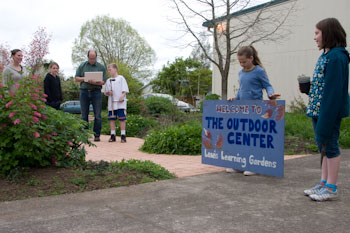 Student Produced Video Field Trips
Student Produced Video Field Trips
8 - During: Quality Control ↓
Some careful monitoring during the show will make the difference between no audience and meaningful audience participation.
close ↑
Monitor the downstream signal to insure connectivity ↓
With younger students, the teacher will need to check technical operations before the official broadcast starts. With older students, you can assign the task of verifying signal reception to a "tech checker."
- About 10-15 minutes before the scheduled broadcast start, have your cameraperson and laptop operator begin streaming a shot of the title board or a "Please stand by for our broadcast" sign or a sign at the broadcast site—with the microphone turned off or NOT connected. (The audio during this busy time could be chaotic and embarrassing!)
- On a cell phone, you or your tech checker should call the contact classroom to be sure they can "see" the video.
- Once video is verified, turn on the mike and run an audio check, again verifying with the class at the receiving end.
- Have the contact classroom test sending a chat question, as well.
- At showtime, begin with a wide shot showing where you are and have your principal or anchorperson introduce and explain where you are, who you are (the class, not individual students), and why you are there.
close ↑
Remember: Keep going no matter what ↓
Everyone should know: Once the show has begun, keep going no matter what. There is no "stop, let's start over." There is no, "You said that wrong!" There is no, "You were supposed to do this..." Keep going. Cover mistakes as smoothly as possible.
If students receive a question they and any on-site experts cannot answer, students should offer to find out and respond to the question in the next few days via the information area or comment area on the archived recording page.
Resist the urge to the "in charge" and instead allow the students to work out problems for themselves. Only in cases where their mistakes are causing problems for the experts who work at the site or are doing something dangerous should you step in. Otherwise, whisper suggestions to the student director when something goes wrong.
You should also monitor timing to keep the show within time limits. You may need to signal for questions to be repeated more loudly and clearly during Q/A. A hand behind your ear can signal this.
When the broadcast ends and the "all clear" signal is given, expect students to all talk at once about what happened, especially any mistakes. This is a good time to referee, keeping comments constructive.
close ↑
Photos taken during a video field trip by Merriwether Lewis Elementary, Portland, Oregon in celebration of Earth Day 2009.
